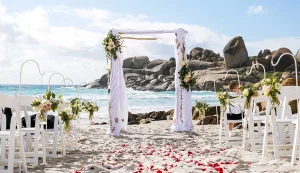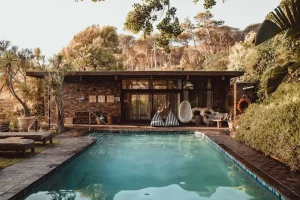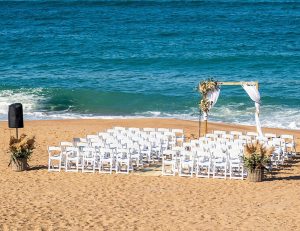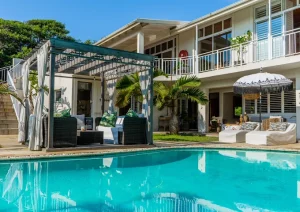Gone are the days when weddings in South Africa meant hundreds of guests and sprawling venues. In 2025, many couples are reshaping their expectations, prioritising intimacy, authenticity, and sustainability. Micro‑weddings, with guest lists under 50, are on the rise. Surveys like The Knot Worldwide’s reveal that 48% of couples are considering this option, climbing to 57% among those already engaged (The Knot Worldwide). Locally, wedding planners in Cape Town and Johannesburg report more requests for boutique vineyard ceremonies and private estate celebrations over traditional ballrooms.
Yet, traditional weddings remain powerful, rooted in rich cultural heritage, multi-day celebrations, and the involvement of extended family. Whether you’re debating a micro ceremony or a grand celebration, it’s less about right or wrong and more about what represents your love story best.
What Is a Micro‑Wedding?
Micro‑weddings in South Africa typically feature 10 to 50 guests, often held at boutique vineyards, private gardens, luxury guesthouses or even family estates. These weddings emphasize meaningful interactions, with every detail carefully curated: personalised vows, bespoke cocktails, intimate seating, or handcrafted favours.
Industry reports in SA highlight that micro‑weddings with a luxe twist (featuring custom cocktails, live cooking stations, bespoke stationery, and elevated décor) are especially in demand (Hidden Gems Venues). Local planners in Cape Town confirm couples love venues like boutique wine estates in Stellenbosch, Paarl, or boutique hotels in Franschhoek.
Celebrants also note that micro‑weddings lend themselves to immersive experiences, think live caricature artists, private mixologists crafting cocktails, or small interactive food stations, enriching every moment with luxury despite a smaller budget.
The Traditional South African Wedding
Traditional weddings in SA often feature 100+ guests, involving extended families, cultural rituals, and multi-day festivities. They remain particularly prevalent within Zulu, Indian, Afrikaans, and other cultural communities. These ceremonies typically involve religious services, traditional attire, and large venue rentals such as hotels, church halls or large safari lodges.
For example, Avianto in Gauteng and The Forum Embassy Hill in Cape Town or safari lodges like Zulu Nyala remain popular choices. These venues offer multi-function capacity and cultural flexibility. While these events are often more expensive, costing R150,000–R500,000+, they reflect deep cultural connections and communal celebration.
Even large religious ceremonies continue across SA: for instance, the International Pentecost Holiness Church in Heidelberg recently hosted a mass wedding for around 3,000 participants, some entering polygamous customary marriages, an extreme example of tradition upheld at scale (apnews.com).
Cost Comparison: Savings vs Splurge
In South Africa, micro‑weddings typically cost between R40,000–R120,000, thanks to smaller catering, rental, décor and guestlist management. Many couples splurge instead on high‑end photography, fine dining or bespoke décor to maintain luxury within budget.
Traditional weddings can range from R150,000 to over R500,000, especially when guest numbers exceed 150, venues require large halls or marquees, and cultural rites require multiple events such as wine ceremonies or separate receptions.
With micro‑weddings, savings are found in reduced scale, but couples still invest in quality. For instance, luxury food stations, featuring local produce and interactive elements like build‑your‑own sushi or braai‑style cooking, often dominate guest experiences, even in intimate settings (Hidden Gems Venues),(Dear Diary).
Emotional & Social Considerations
A micro‑wedding’s intimacy can deepen connection, but may also strain family expectations. Some planners note that couples often wrestle with limiting the guest list: deciding which friends or extended relatives to invite can be emotional. As one planning guide puts it, micro‑weddings “offer intimate connections and cost savings but limit guest participation” while larger weddings welcome entire communities, with added complexity (Dear Diary).
Many SA planners report that micro‑weddings appeal to couples prioritising mindfulness and authenticity over tradition. Families may push for larger gatherings, but couples are increasingly finding ways to compromise, for example, hosting a separate, smaller post‑wedding party for extended family or streaming their ceremony virtually.
Legal & Logistical Differences
Legal marriage requirements with Home Affairs remain unchanged regardless of scale. However, micro‑weddings often simplify logistics dramatically: fewer vendors, straightforward seating and layout needs, and reduced exposure to problems like load-shedding. Private venues often don’t require extensive event permits, so planning becomes more streamlined.
What SA Couples Are Choosing in 2025
National and global data point toward rising interest in micro‑weddings: international reports show 48%–57% of engaged couples leaning this way (The Knot Worldwide). In South Africa, planners in Cape Town and Johannesburg confirm this especially in eco-conscious, boutique-centric areas.
Different regions trend differently: in Cape Town, eco-luxe micro‑weddings held at vineyards or boutique estates are especially popular. In Gauteng, hybrid models, small ceremonies followed by larger receptions or streamed events are gaining traction. In Durban, traditional Indian and Zulu weddings remain strong, often resisting the micro‑trend given cultural importance of broader familial gathering.
What Feels Right for You
There’s no right or wrong when choosing between micro‑weddings and traditional celebrations in South Africa. It’s about balancing your vision, budget, and cultural or family values. Micro‑weddings offer intimacy, personalization, and cost control, ideal for meaningful moments. Traditional large-scale celebrations offer cultural richness, community involvement, and a communal experience.
Talk with your partner and planner about what matters most, guest experience, meaningful traditions or financial flexibility. Consider hybrid options or post‑event celebrations to satisfy everyone. Above all, your wedding should reflect your story, not tradition by default.
Featured Image: Pixels








